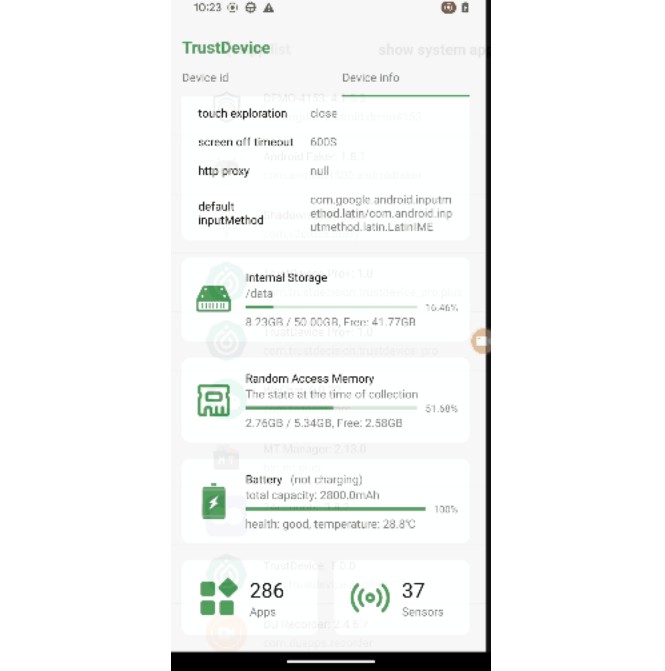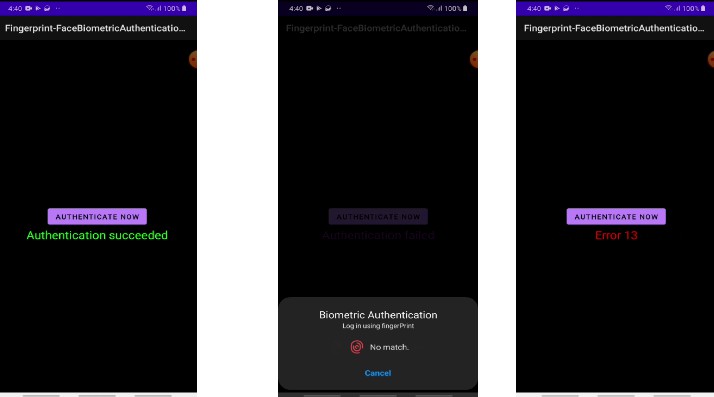fingerprint android
Lightweight library for device identification and fingerprinting.
Fully written in Kotlin. 100% Crash-free.
Creates a device identifier from all available platform signals.
The identifier is fully stateless and will remain the same after reinstalling or clearing application data.
Quick start
Add repository
Add these lines to your build.gradle.
allprojects {
repositories {
...
maven { url 'https://jitpack.io' }
}}
Add dependency
Add these lines to build.gradle of a module.
This library depends on kotlin-stdlib.
If your application is written in Java, add kotlin-stdlib dependency first (it's lightweight and has excellent backward and forward compatibility).
dependencies {
// Add this line only if you use this library with Java
implementation "org.jetbrains.kotlin:kotlin-stdlib:$kotlin_version"
implementation "com.github.fingerprintjs:fingerprint-android:1.0.1"
}
deviceId vs fingerprint
The library operates with two entities.
deviceId- is a random and unique device identifier.
Can be used by developers to identify devices to deliver personalized content, detect suspicious activity, and perform fraud detection.
Internally it will use Google Service Framework ID if it's available and ANDROID_ID, if GSF ID is not available.
This identifier is stable, i.e. it will remain the same even after reinstalling your app.
But it will be different after factory reset of the device.
fingerprintis a digital device fingerprint. It works by combining all available device signals and attributes into a single identifier. There is a probability that two identical devices will have the samefingerprint.
Which one should I use?
deviceId is guaranteed to be random and should be your first choice for device identification. This identifier can be spoofed though and shouldn't be used in security-focused or fraud detection scenarios.
fingerprint is much harder to spoof and is a safer choice in security-focused use cases.
Usage
Kotlin
// Initialization
val fingerprinter = FingerprinterFactory
.getInstance(applicationContext, Configuration(version = 1))
// Usage
fingerprinter.getFingerprint { fingerprintResult ->
val fingerprint = fingerprintResult.fingerprint
}
fingerprinter.getDeviceId { result ->
val deviceId = result.deviceId
}
Java
// Initialization
Fingerprinter fingerprinter = FingerprinterFactory
.getInstance(getApplicationContext(), new Configuration(1));
// Usage
fingerprinter.getFingerprint(new Function1<FingerprintResult, Unit>() {
@Override
public Unit invoke(FingerprintResult fingerprintResult) {
String fingerprint = fingerprintResult.getFingerprint();
return null;
}
});
fingerprinter.getDeviceId(new Function1<DeviceIdResult, Unit>() {
@Override
public Unit invoke(DeviceIdResult deviceIdResult) {
String deviceId = deviceIdResult.getDeviceId();
return null;
}
});
getFingerprint and getDeviceId methods execute on a separate thread. Keep this in mind when using results on the main thread.
Also the results are cached, so subsequent calls will be faster.
Versioning
fingerprint is versioned incrementatlly; the version should be set explicitly to avoid unexpected fingerprint changes when updating the library.
The version is set while the initialization of the library with Configuration class.
val fingerprinter = FingerprinterFactory
.getInstance(applicationContext, Configuration(version = 1))
Advanced usage
Reference for Kotlin is provided below. Java reference.
The full public API of the library is following:
interface Fingerprinter {
fun getDeviceId(listener: (DeviceIdResult) -> (Unit))
fun getFingerprint(listener: (FingerprintResult) -> (Unit))
fun getFingerprint(signalProvidersMask: Int, listener: (FingerprintResult) -> (Unit))
}
interface FingerprintResult {
val fingerprint: String
fun <T> getSignalProvider(clazz: Class<T>): T?
}
data class DeviceIdResult(
val deviceId: String,
val gsfId: String?,
val androidId: String
)
Increasing the uniqueness of fingerprints
There is a probability that two different devices will have the same fingerprint value. There is also a probability that the same device will have different fingerprint values in different moments of time due to system upgrades or updated settings (although this should be infrequent).
A device fingerprint can be calculated using various signals.
These signals are grouped into several categories:
- Hardware signals (e.g. CPU info, sensors list etc.)
- OS build signals & attributes (the information about current ROM, its version etc.)
- Device state information (the information about some settings of the device)
- Installed apps information (unstable signal source as apps get reinstalled all the time).
By default we only use signals from sources #1, #2, and #3, because this combination provides the best balance between fingerprint uniqueness and stability.
You can increase the uniqueness by adding the installed apps signal source, but this will decrease the stability of fingerprints.
Example of how to use all available signal providers for fingerprint calculation.
This will improve the uniqueness of the fingerprint, but also it will reduce the stability i.e. the fingerprint will change more frequently.
val signalMask = SignalProviderType.HARDWARE or
SignalProviderType.OS_BUILD or
SignalProviderType.DEVICE_STATE or
SignalProviderType.INSTALLED_APPS
fingerprinter.getFingerprint(signalMask) { fingerprintResult ->
val customFingerprint = fingerprintResult.fingerprint
}
Raw data access
If you need access to raw data from signal providers, you can get it as shown below:
fingerprinter.getFingerprint { fingerprintResult ->
val hardwareSignalProvider = fingerprintResult
.getSignalProvider(HardwareSignalProvider::class.java)
val hardwareFingerprint = hardwareSignalProvider.fingerprint()
val cpuInfo = hardwareSignalProvider.rawData.procCpuInfo
}
Change hash function
The library uses MurMur3 hash (64x128) which is fast and optimal for most cases.
If this hash function does not work for you, you can change it to a different one.
To do it, implement your own hasher, and pass it to Configuration class as shown below:
val hasher = object : Hasher {
override fun hash(data: String): String {
// Implement your own hashing logic, e.g. call SHA256 here
}
}
val fingerprinter = FingerprinterFactory.getInstance(
applicationContext,
Configuration(version = 1, hasher = hasher)
)
Backward compatibility
If you want to get a newer version of fingerprint, but also want to keep the old one for backward compatibility, you can get them both as shown below:
val v1Fingerprinter = FingerprinterFactory
.getInstance(applicationContext, Configuration(version = 1))
val v2Fingerprinter = FingerprinterFactory
.getInstance(applicationContext, Configuration(version = 2))
v1Fingerprinter.getFingerprint { fingerprintResult ->
val v1Fingerprint = fingerprintResult.fingerprint
}
v2Fingerprinter.getFingerprint { fingerprintResult ->
val v2Fingerprint = fingerprintResult.fingerprint
}
Playground App
Try all the library features in the Playground App.

Android API support
fingerprint-android supports API versions from 16 (Android 4.1) and higher.




